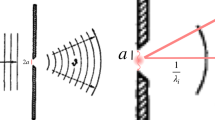Abstract
Research in physics has its impact on world view; physics influences the image of nature. On the other hand philosophy thinks about nature and the role of man. The insight that philosophy might indicate the frontiers of human possibilities of thought makes it highly desirable to teach these aspects in physics education. One of the most exciting examples is quantum theory which v. Weizsäcker called a ‘fundamental philosophical advance’. I give some hints to implementing philosophical aspects into a course on quantum theory. For this purpose I designed a dialogue between three philosophers – from the Antique, the Enlightenment and a quantum philosopher – discussing results of quantum theory on the background of important philosophical terms. Especially the views of Aristotle are reviewed. This idea has been carried out in a supplementary course on quantum theory for interested teacher students and for in-service training of teachers.
Similar content being viewed by others
References
Einstein, A., Podolsky, B. & Rosen, N: 1935, ‘Can Quantum-mechanical Description of Physical Reality be Considered Complete?’, Phys.Rev. 48, 696–702.
Feynman, R. et al: 1971, The Feynman Lectures on Physics, Part III: Quantum Mechanics, Oldenbourg, München.
Giulini, D. et al: 1996: Decoherence and Appearance of a Classical World in Quantum Theory, Springer Berlin, Heidelberg.
Görnitz, Th.: 1999, Quanten sind anders, Spektrum Akademischer Verlag, Heidelberg.
Haag, R.: 1996, Local Quantum Physics-Fields, Particles, Algebras, Springer Verlag, Heidelberg.
Heisenberg, W.: 1976, Der Teil und das Ganze, Deutscher Taschenbuch Verlag, Stuttgart.
Hirschberger, J.: 1991, Geschichte der Philosophie, Bd.1, (Sonderausgabe), Herder Verlag, Freiburg im Breisgau.
Pospiech, G.: 1999, ‘Teaching the EPR-Paradox at High School?’, Physics Education 5.
Pospiech, G.: 2000a, Information-The Fundamental Notion of Quantum Theory, quant-ph/0002009.
Pospiech, G.: 2000b, ‘Ein Gespräch zwischen Parmenides, Kant und einem Quantenphilosophen’, Praxis der Naturwissenschaft, 8/49, pp. 26–30.
Pospiech, G.: 2001, ‘Experiences With a Modern Course in Quantum Physics’, in:Reinders Duit (ed.), Research in Science Education: Past, Present and Future, Kluwer Academic Publishers, pp. 89–94.
Schrödinger, E.: 1935, ‘Die gegenwärtige Situation in der Quantenmechanik’, Die Naturwissenschaften 23, 807–812, 823–828, 844–849.
Tavan, M.: 1999, ‘Quantum Mechanics in Biophysical Research’, talk at University Frankfurt, 14.4.
v. Weizsäcker, C.F.: 1931, ‘Ortsbestimmung eines Elektrons durch ein Mikroskop’, Z.Phys. 70, 114–130.
v. Weizsäcker, C.F.: 1985, Aufbau der Physik, Deutscher Taschenbuch Verlag, Stuttgart.
v. Weizsäcker, C.F.: 1996, Ein Blick auf Platon, Reclam Verlag, Braunschweig.
Zeilinger A. & Brukner, C.: 2000, ‘Conceptual Inadequacy of the Shannon Information in Quantum Measurement’, quant-ph/0006087.
Author information
Authors and Affiliations
Rights and permissions
About this article
Cite this article
Pospiech, G. Philosophy and Quantum Mechanics in Science Teaching. Science & Education 12, 559–571 (2003). https://doi.org/10.1023/A:1025384115480
Issue Date:
DOI: https://doi.org/10.1023/A:1025384115480




